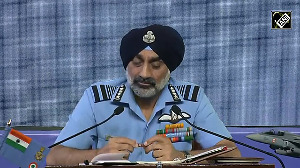South Asia experts have cautioned the US Congress not to impose any additional conditions on India in an attempt to clinch the India-US civilian nuke deal as it could scuttle the landmark agreement itself and also significantly damage the burgeoning US-India relationship.
Testifying at a hearing of the full committee of the House International Relations Committee in Washington on Wednesday, Ashley Tellis, Stephen Cohen, Francine R. Frankel and Satu Limaye voiced their views on why the nuke deal was important for India as well as the United States.
They rejected India signing a fissile material treaty or any such thing as a pre-condition for Congressional approval of the civilian nuclear deal, and said it could have negative consequences for both India and the United States.
They also said India needs to be treated as part of the solution to proliferation rather than as a part of the problem.
The hearing on 'The US-India Global Partnership: How Significant for American Interests?' was called by Chairman of the Committee Henry Hyde to examine the implications of the civilian nuclear cooperation between India and the United States.
Two other hearings have already been held with the Bush administration officials and nuke experts.
Congressman from New York Gary Ackerman, senior member of the House, who wholeheartedly supports the India-US landmark agreement, brought up the issue of conditions.
He said, ''I would point out to those critics of the agreement that there are already many very serious and difficult conditions contained in the July 18 joint statement that India will have to meet.
"Indeed, there are some difficult conditions that the United States will have to meet. I also think that since this is likely to be a phased process, and that as long as the administration is forthcoming with information on Indian progress, members of Congress will be able to decide for themselves that India is working to keep its commitments even as we are working to keep ours.''
He added: ''It's perfectly appropriate for the Congress to include the conditions in the joint statement as part of the legislation we consider, but I have yet to be persuaded that the benefit of adding additional conditions would outweigh their cost.''
Ashley Tellis, senior associate at the Carnegie Endowment for International Peace, said it would be impossible to get India to cap its fissile material production as it is a matter of its national security issue in a region where China has a bigger stockpile of nuke weapons.
However, he said if a global agreement on a cut-off in fissile material was evolved, India would not lag behind in signing it.
He said the most important contribution that the legislative branch can make is by helping to change India's status from that of a target under US non-proliferation laws to that of a full partner.
''The Bush Administration's civilian nuclear agreement with India is directed fundamentally towards this objective. It would produce important and tangible non-proliferation gains for the United States just as it would bestow energy and environmental benefits on India,'' Tellis said.
He said so far US non-proliferation laws have treated India as a problem to be contained rather than as a partner to be engaged. It was the Bush Administration that looked at India through a new prism, he said.
He said: "In contrast to the past, President Bush sees India as part of the solution to proliferation rather than as part of the problem. He also views the growth of Indian power as beneficial to the United States and its geopolitical interests in Asia and hence worthy of strong American support."
· 'It is the best nuclear deal India could have got'
Tellis also pointed out to the critics of the agreement signed between US President Bush and Prime Minister Manmohan Singh that they have failed to see the shrewdness of rewarding India's record of voluntary non-proliferation with urgently needed civilian nuclear programmes while placing India's future nuclear development within an international framework.
He also said that by ensuring India's nuclear programme enjoys the same benefits and is bound by the same obligations as other powers in the non-proliferation regime, the US is invoking one of its top national security priorities: the prevention of nuclear commerce between India and a rogue state or non-state actor.
Referring to the criticism that other non-signatories to the NPT like Pakistan or North Korea would demand the same recognition and benefits for their nuclear programmes as that of India, Tellis argued that such fears were groundless 'since India, a democratic and rapidly developing nuclear power with a good non-proliferation track record outside the NPT is almost universally acknowledged to be an exception and not the rule'.
Tellis also urged the US Congress to recognise the American national security benefits of bringing India into the recognised nuclear fold.
Stephen Cohen, senior fellow at the Brookings Institute, who was more critical of India's nuclear programme, said both the US and India miscalculated the complexity of this deal and the likely opposition.
"Our own abysmal knowledge of India and its politics contributed to this situation," he said.
He also said India would not be a dependent state nor will it become a close ally like Britain. At best, he said, it could emerge as an Asian France, ''a state with which we have many shared interests but one that sees the world through its own prism, not ours.''
The South Asia experts also agreed that advancing the growth of India as a global power, as the Bush Administration intends, is not directed 'at containing China' as many critics have alleged.
Such a policy of containing China is neither feasible nor necessary at this point because India too has no interest in becoming part of any coalition aimed at containing China.
Francine R Frankel, professor from the University of Pennsylvania, said, ''New Delhi has too much at stake in improving its relations with Beijing to be drawn into robust demonstration of support for US interests.''
On the contrary, she pointed out that 'the mindset of India advocates for a natural partnership between the two countries as better described by the determination not to walk into a US trap by becoming overtly anti-Chinese'.
Also read:
Deal unique to India: Burns
Column: Do we really need the nuclear deal with the US?
Column: The nuclear deal
Complete Coverage: India goes nuclear





